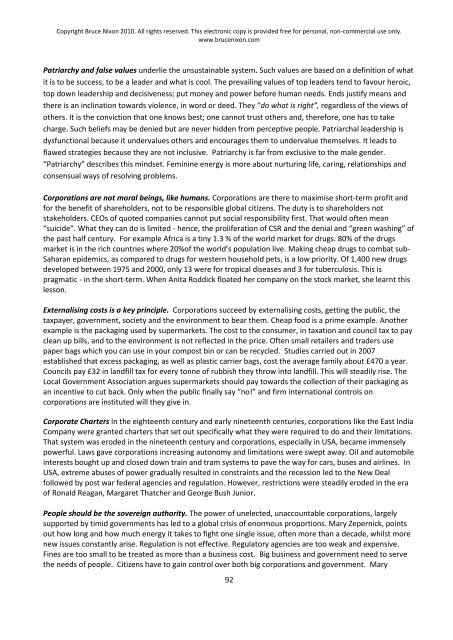A better world is possible - Global Commons Institute
A better world is possible - Global Commons Institute
A better world is possible - Global Commons Institute
Create successful ePaper yourself
Turn your PDF publications into a flip-book with our unique Google optimized e-Paper software.
Copyright Bruce Nixon 2010. All rights reserved. Th<strong>is</strong> electronic copy <strong>is</strong> provided free for personal, non-commercial use only.<br />
www.brucenixon.com<br />
Patriarchy and false values underlie the unsustainable system. Such values are based on a definition of what<br />
it <strong>is</strong> to be success, to be a leader and what <strong>is</strong> cool. The prevailing values of top leaders tend to favour heroic,<br />
top down leadership and dec<strong>is</strong>iveness; put money and power before human needs. Ends justify means and<br />
there <strong>is</strong> an inclination towards violence, in word or deed. They “do what <strong>is</strong> right”, regardless of the views of<br />
others. It <strong>is</strong> the conviction that one knows best; one cannot trust others and, therefore, one has to take<br />
charge. Such beliefs may be denied but are never hidden from perceptive people. Patriarchal leadership <strong>is</strong><br />
dysfunctional because it undervalues others and encourages them to undervalue themselves. It leads to<br />
flawed strategies because they are not inclusive. Patriarchy <strong>is</strong> far from exclusive to the male gender.<br />
“Patriarchy” describes th<strong>is</strong> mindset. Feminine energy <strong>is</strong> more about nurturing life, caring, relationships and<br />
consensual ways of resolving problems.<br />
Corporations are not moral beings, like humans. Corporations are there to maxim<strong>is</strong>e short-term profit and<br />
for the benefit of shareholders, not to be responsible global citizens. The duty <strong>is</strong> to shareholders not<br />
stakeholders. CEOs of quoted companies cannot put social responsibility first. That would often mean<br />
“suicide”. What they can do <strong>is</strong> limited - hence, the proliferation of CSR and the denial and “green washing” of<br />
the past half century. For example Africa <strong>is</strong> a tiny 1.3 % of the <strong>world</strong> market for drugs. 80% of the drugs<br />
market <strong>is</strong> in the rich countries where 20%of the <strong>world</strong>’s population live. Making cheap drugs to combat sub-<br />
Saharan epidemics, as compared to drugs for western household pets, <strong>is</strong> a low priority. Of 1,400 new drugs<br />
developed between 1975 and 2000, only 13 were for tropical d<strong>is</strong>eases and 3 for tuberculos<strong>is</strong>. Th<strong>is</strong> <strong>is</strong><br />
pragmatic - in the short-term. When Anita Roddick floated her company on the stock market, she learnt th<strong>is</strong><br />
lesson.<br />
External<strong>is</strong>ing costs <strong>is</strong> a key principle. Corporations succeed by external<strong>is</strong>ing costs, getting the public, the<br />
taxpayer, government, society and the environment to bear them. Cheap food <strong>is</strong> a prime example. Another<br />
example <strong>is</strong> the packaging used by supermarkets. The cost to the consumer, in taxation and council tax to pay<br />
clean up bills, and to the environment <strong>is</strong> not reflected in the price. Often small retailers and traders use<br />
paper bags which you can use in your compost bin or can be recycled. Studies carried out in 2007<br />
establ<strong>is</strong>hed that excess packaging, as well as plastic carrier bags, cost the average family about £470 a year.<br />
Councils pay £32 in landfill tax for every tonne of rubb<strong>is</strong>h they throw into landfill. Th<strong>is</strong> will steadily r<strong>is</strong>e. The<br />
Local Government Association argues supermarkets should pay towards the collection of their packaging as<br />
an incentive to cut back. Only when the public finally say “no!” and firm international controls on<br />
corporations are instituted will they give in.<br />
Corporate Charters In the eighteenth century and early nineteenth centuries, corporations like the East India<br />
Company were granted charters that set out specifically what they were required to do and their limitations.<br />
That system was eroded in the nineteenth century and corporations, especially in USA, became immensely<br />
powerful. Laws gave corporations increasing autonomy and limitations were swept away. Oil and automobile<br />
interests bought up and closed down train and tram systems to pave the way for cars, buses and airlines. In<br />
USA, extreme abuses of power gradually resulted in constraints and the recession led to the New Deal<br />
followed by post war federal agencies and regulation. However, restrictions were steadily eroded in the era<br />
of Ronald Reagan, Margaret Thatcher and George Bush Junior.<br />
People should be the sovereign authority. The power of unelected, unaccountable corporations, largely<br />
supported by timid governments has led to a global cr<strong>is</strong><strong>is</strong> of enormous proportions. Mary Zepernick, points<br />
out how long and how much energy it takes to fight one single <strong>is</strong>sue, often more than a decade, whilst more<br />
new <strong>is</strong>sues constantly ar<strong>is</strong>e. Regulation <strong>is</strong> not effective. Regulatory agencies are too weak and expensive.<br />
Fines are too small to be treated as more than a business cost. Big business and government need to serve<br />
the needs of people. Citizens have to gain control over both big corporations and government. Mary<br />
92
















